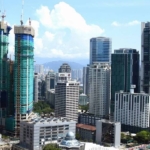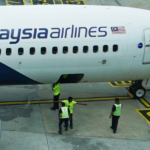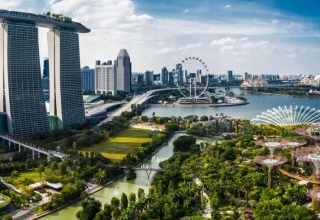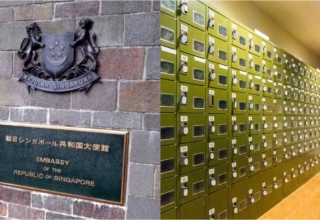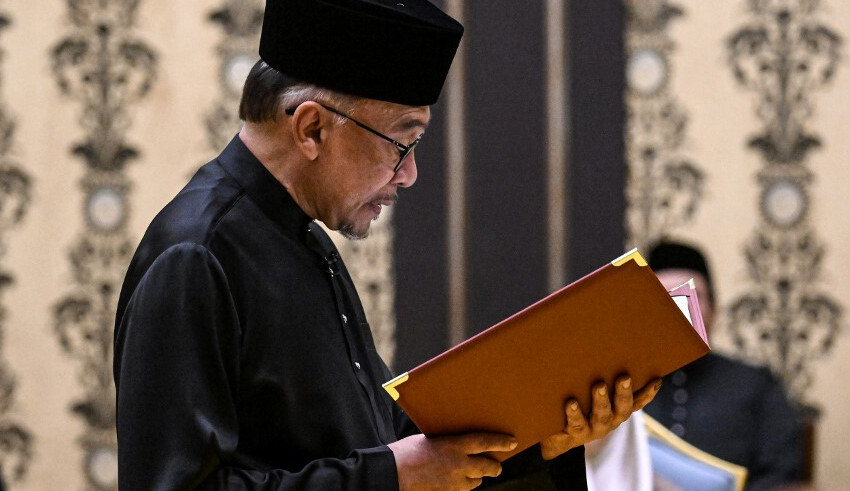
At his first news conference as Malaysia’s prime minister, Anwar Ibrahim pledged to protect the constitutionally mandated special rights of the Malay majority and the status of Islam.
Upon being confirmed as prime minister during the May 2018 elections, Mahathir Mohamad also pledged to preserve Malay and Muslim interests.
Despite their stark contrasts, the two Malay political heroes followed a similar script since ethnically mixed parties outnumbered Malay parties in the coalitions they each created, leaving them open to accusations that they did not adequately represent the country’s ethnic majority.
Anwar’s National Justice Party, often known by its Malay language initials PKR, and its close ally, the Democratic Action Party (DAP), have the vast majority of the legislative seats held by Pakatan Harapan (PH), the new ruling coalition’s anchor.
The coalition, formed after a week of negotiations following the inconclusive general election on November 19, unites the People’s Front (PH) with East Malaysian regional parties and, most significantly, its traditional archrival, the United Malays National Organization (UMNO).
Anwar was able to obtain the approval of Malaysia’s king to establish a government after UMNO’s defection to the People’s Front of Malaysia. Despite being promoted by the king’s seal to become Malaysia’s tenth prime minister, Anwar is cognizant of the need to strengthen Malay support.
Despite being the overwhelming favorite of non-Malays for the past 15 years, the Philippines has always struggled to win over the Malay population. The most recent election was similar. According to preliminary estimates, only 11% of Malay voters supported PH.
In addition, the tide has turned against UMNO as the guardian of Malays; the party received only one-third of Malay votes and won only 26 seats, compared to 54 in 2018.
This time around, the majority of Malays supported the coalition between the Malaysian United Indigenous Party (Bersatu) and the Pan-Malaysian Islamic Party (PAS) (PAS). The two parties gained a total of 76 seats, up from 31 the previous election, and swept the Malay heartlands of peninsular Malaysia.
In the past five years, Bersatu, UMNO, and PAS have discombobulated Malaysian politics. Anwar would be challenged to maintain UMNO’s support while keeping PAS and Bersatu at bay.
Due to defections from PKR to Bersatu and Bersatu’s resignation from the ruling coalition, the alliance between Mahathir and Anwar, which was successful in 2018, disintegrated in February 2020. The “Malay unit” troika of UMNO, Bersatu, and PAS that afterwards assumed power was similarly unstable, resulting in a new government transition in August 2021.
Anwar will want his government of unity to perform better. His government gives UMNO and East Malaysian parties their due importance within his broad new coalition.
Despite its huge victory in Malay areas, the Bersatu-PAS alliance is now entrenched and furious after being outmanoeuvred by PH for control of the government. The two parties openly support Malay causes and will undoubtedly claim that Anwar’s administration does not.
Keep Reading
Ultimately, his administration’s popularity will depend on its policies. Its current emphasis on the welfare of the people, effective public spending, and East Malaysian issues is pertinent and essential. However, he must demonstrate resolution, not reluctance, about the Malay community’s cherished ethnic preference policies.
In 2018-2020, PH’s brief time in office was cut short by both political treachery and policy incoherence.
PH frequently rejects race-based policies and proposes instead need-based solutions. This dedication to need-based aid has productively focused attention on low-income families, but its prescription for “replacing” race-based programs is fundamentally incorrect.
Instead, the partnership should recognize that basic welfare provisions for all Malaysians, especially the poor, and targeted support to expand the participation and achievement of designated groups, whether on the basis of ethnicity or gender, are two independent and durable policy realms.
They cannot be interchanged; Malaysia is active in both dimensions. In fact, the country has expanded social protection for everybody in recent years, with special interventions in higher education and enterprise development for the minority Indian and indigenous Orang Asli populations, as well as for women.
In addition, the coalition should articulate its critique and proposed solution to the current quo’s issues.
The administration of Anwar must stop stigmatizing pro-Malay measures. Undoubtedly, many programs are susceptible to favoritism and corruption, particularly where huge government contracts and wealth transfer are involved; but, these extreme situations must not be confused with the overall system.
Through technical colleges, university admissions, microfinance, loans for small and medium-sized firms (SMEs), public procurement carve-outs, property discounts, and more, the system provides tremendous opportunities to all strata of the community.
The task for the administration led by PH is not, as is frequently said or suggested, to dismantle such measures, but to make group-specific empowerment more equitable and successful. The rhetoric about replacing race-based policies with need-based ones, couched in imprecise and emotionally-charged terms, inflames the tension between minority groups’ hopes for reform and the Malay fear that they will lose their privileged opportunities.
Lastly, the coalition must embrace a methodical viewpoint. Moving forward requires recognizing the enduring roles and specific contexts of both universal welfare provisions, such as early and primary education, health care, and a basic income, and group-targeted empowerment, which focuses on higher education, professional and managerial positions, small and medium-sized enterprises (SMEs), and ownership.
Malaysia must identify measures to make group-targeted empowerment more equitable and effective, such as giving precedence to the disadvantaged of both majority and minority groups in admissions to higher education and improving SME development for Malays, Indians, Orang Asli, and women.
With concerted effort, viewpoints and expectations on all sides may become more enlightened and reasonable. If Anwar hesitates and maintains Pakatan Harapan’s ambiguity on ethnic issues, the ruling coalition will perpetually and futilely seek to gain traction with the Malay majority. His administration is on the defensive due to the necessity to convey assurances that he will protect Malay interests.
Anwar must demonstrate his capabilities via action, not just words. He must introduce a fresh narrative and advance it.
